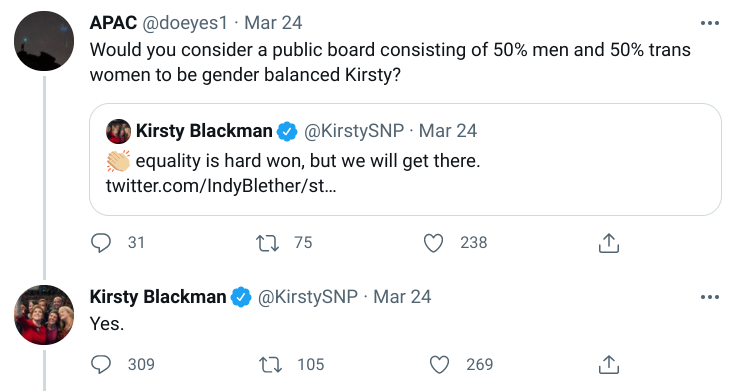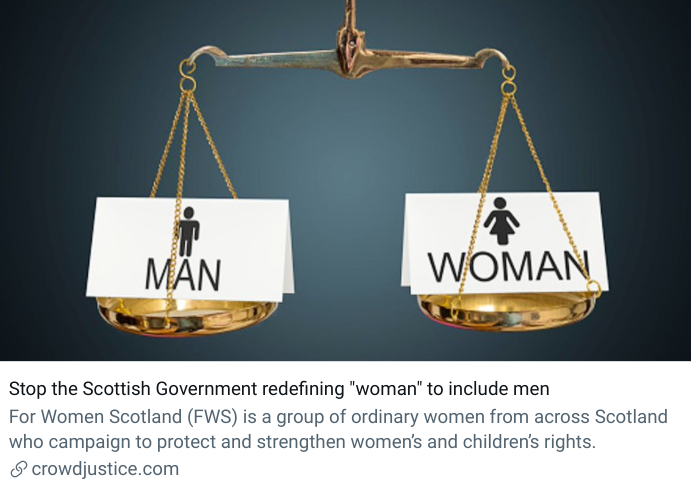The Status of Women In Scotland – Gender Representation on Public Boards Act
UN Women invited submissions to the Commission on the Status of Women with information relating to alleged violations of human rights that affect the status of women in any country in the world. Our full submission can be found here but we have also turned each section into the following stand alone blog pieces:
Gender Representation on Public Boards Act I All-Women Shortlists I Census and Data Collection on Sex I Hate Crime and Public Order Act I Prisons I Women’s Services and the Genuine Occupational Requirement I Conclusions

- In 2018, the Scottish Parliament passed the Gender Representation on Public Boards (Scotland) Act1 (GRPBA), aimed at improving the representation of women on the boards of Scottish public bodies. The Act was introduced to redress historic under-representation of women on these boards by setting an objective for the non-executive member component in order to achieve 50% female representation. The Act places duties on public authorities, appointing persons, and Scottish Ministers in connection to their role in achieving the gender representation objective. The Statutory Guidance was published on 29 May 2020.2
- Originally, the Scottish Government proposed that its 50% objective would be for those who are “female or who identify as female”,3 but after a public consultation this was changed to “women” when the Bill was introduced to Parliament in June 2017.4 According to the Policy Memorandum, “this step was taken to ensure that the Bill reflects the protected characteristic of sex in the Equality Act 2010”.5
- However, during Stage 2 of the legislative process, following representations from Scottish Trans Alliance,6 an amendment was laid to change the definition of “woman” to include “a person who has the protected characteristic of gender reassignment (within the meaning of section 7 of the Equality Act 2010) if, and only if, the person is living as a woman and is proposing to undergo, is undergoing or has undergone a process (or part of a process) for the purpose of becoming female”.7
- This amendment was unanimously agreed by the Committee and incorporated into the Bill without a Parliamentary debate or vote.8
- The Statutory Guidance, as drafted, expanded on the definition of “woman” and set out examples of what would be regarded as evidence that the person was ‘living as a woman’: “This would not require the person to dress, look or behave in any particular way. However, it would be expected that there would be evidence that the person was continuously living as a woman, such as – always using female pronouns; using a female name on official documents such as a driving licence or passport, or on utility bills or bank accounts; describing themselves and being described by others in written or other communication using female language…The Act does not require an appointing person to ask a candidate to prove that they meet the definition of woman in the Act.”9
- The Scottish Government held a public consultation on this draft Statutory Guidance in 2019 which received over 300 responses, the majority of which focused on the terminology, more specifically the definition of “woman”, the confusion of the different protected characteristics of “sex” and “gender reassignment”, the exclusion of women who did not meet the “living as a woman” criteria, and the undermining of the purpose and value of the Act.10
- Despite a specific question in the consultation asking respondents’ views on the terminology, the Scottish Government initially claimed the responses were outwith the scope of the consultation and then decided to disregard them on the basis that they contradicted a predetermined Government “policy”11 – a policy that the Government is unable to provide a written copy of in response to a Freedom of Information request.
- For Women Scotland (FWS) believe that this Act, which was intended to address historical under-representation of women on public boards, is fundamentally flawed and the Scottish Ministers acted unlawfully and in contravention of their duties under reserved UK equality legislation which led to the Scottish Parliament exceeding its legislative competency in redefining “woman”. This wholesale redefinition of women was done at the request of the registered lobby group, Scottish Trans Alliance (the ‘project’ of the organisation Equality Network), and without public consultation or full and proper Parliamentary debate or scrutiny.
- Following a successful crowdfunder FWS sought a Judicial Review on this Act on the basis that:
- The Scottish Parliament has acted outwith its legislative competence by confusing the distinct protected characteristics of “sex” and “gender reassignment”. The UK Equality Act only allows for measures for those persons who share a protected characteristic, not for merging elements of different protected characteristics.
- The redefinition of “woman” includes persons who may self-identify as women, but who the Equality Act would characterise as male. It also excludes persons who would be characterised as female, ie. those women who self-identify as men.
- The redefinition of “woman” goes against the very grain of the Equality Act 2010 and decades of anti-discrimination law.
- The GRPBA is incompatible with EU law, which only makes provision for the possibility of workplace-related “positive action” in relation to inequality between the sexes.
- Scottish Ministers failed to assess the impact of applying the new law on the need to advance equality between women and men, or consider the need to foster good relations.
- Unfortunately, the Court of Session ruled with the Scottish Ministers in March 202112 and FWS are currently engaged in appealing the decision. The substantive hearing is scheduled for 03 November 2021.
- It is of additional concern that the Ministers’ legal representatives argued, contrary to the United Nations definition of sex as biological and the clear statement that discrimination against women is on the basis of sex in Article 1 of the Convention on the Elimination of All Forms of Discrimination Against Women (CEDAW)13, that the GRPBA is compliant with CEDAW in being inclusive of men who self-identify as women (and exclusive of natal women with a trans identity). Given the Scottish Government’s intention to incorporate CEDAW into Scots law, the repercussions from their flawed interpretation will be detrimental and harmful to women’s rights.
- Also in the course of the hearing, it was revealed that Government policy is that “transgender women are to be treated as non-transgender women unless to do so would otherwise be prohibited by law”.14 ie. a man who self-identifies as a woman is to be deemed a woman. This contravenes the current (devolved to Scotland) Gender Recognition Act 200415 which specifies a two year process and the requirement of a medical diagnosis of gender dysphoria prior to making an application to obtain a Gender Recognition Certificate for a person to be recognised, for most purposes in law, as the opposite sex.
- It was also stated in court that the GRPBA, with its definition of women, was an implementation of that policy.
- There is no public record of this policy being formulated, Freedom of Information requests can elicit no Government record of it, there has been no public consultation, no evidence gathering, no debate, no impact assessment – all of which contravene the Government’s Public Sector Equality Duty and 2012 Specific Duties Regulations.16
- This policy is almost certainly the one referred to in paragraph 7 above, which resulted in the rejection of the submissions of hundreds of women to a public consultation, and who were thus denied any input into what was supposed to be a democratic process.
- Public support for the legal challenge on the GRPBA is high, with almost £175,000 raised to date to fund legal costs.17 This is against the backdrop of the Equality and Human Rights Commission in Scotland18 – the independent body responsible for upholding equality and human rights laws – failing to take any action to hold the Government to account, or even to participate in the legal case when petitioned. This is especially galling as it was this body who first warned the Scottish Government of the likely unlawfulness of the GRPBA.19

- Reform of the Gender Recognition Act is currently a heated topic of public debate in Scotland and the Government’s recent proposals to remove the requirement for a medical diagnosis of gender dysphoria and make legal change of sex a matter for self-identification have been delayed due to Covid-19. However, it is concerning that, in the meantime, the GRPBA has been used to bring in self-identification of sex by the back door. We believe this has encouraged similar misuses of the protected characteristic of sex in other legislation that has been laid before Parliament, for example in the collection of data on sex in the national census which will be on the basis of self-identification (see Census and Data Collection on Sex), and the possibility of the definition of sex changing should it be added as a characteristic to the Hate Crime and Public Order Act.20
- The implications of the GRPBA extend beyond Scotland as, if it becomes established that devolved legislatures can amend key terms in the UK Equality Act via other pieces of legislation, then other countries within the UK may follow and the Equality Act will ultimately be undermined.
References
- Gender Representation on Public Boards (Scotland) Act 2018
- Gender Representation on Public Boards (Scotland) Act 2018: statutory guidance
- A Scottish Government Consultation on the Draft Gender Representation on Public Boards (Scotland) Bill, page 10
- Gender Representation on Public Boards (Scotland) Bill, as introduced
- Policy Memorandum on Gender Representation on Public Boards (Scotland) Bill, page 15
- Stage 1 report on the Gender Representation on Public Boards (Scotland) Bill, paras 20 and 50
Previous oral evidence to Committee from James Morton, Scottish Trans Alliance - List of Amendments for Stage 2, Gender Representation on Public Boards (Scotland) Bill
- Equalities and Human Rights Committee, page 6
- Gender Representation on Public Boards (Scotland) Act 2018: consultation on implementation
- Gender Representation on Public Boards (Scotland) Act 2018 implementation: consultation analysis
- Freedom of Information release on GRPBA consultation results, paras 15-22
- Judicial Review Opinion
- Convention on the Elimination of All Forms of Discrimination against Women
- The Scotsman, 07 January 2021, Scottish Government can ‘ride roughshod’ over equalities law in row over definition of women in new Act”
- Gender Recognition Act 2004
- Technical Guidance on the Public Sector Equality Duty Scotland
- Crowdjustice – Stop the Scottish Government redefining “woman” to include men
- Equality and Human Rights Commission
- EHRC response to the Scottish Government Consultation of the Draft Gender Representation on Public Boards (Scotland) Bill
- For Women Scotland – Letter to Delegated Powers and Law Reform Committee
Jump to:
Gender Representation on Public Boards Act I All-Women Shortlists I Census and Data Collection on Sex I Hate Crime and Public Order Act I Prisons I Women’s Services and the Genuine Occupational Requirement I Conclusions
